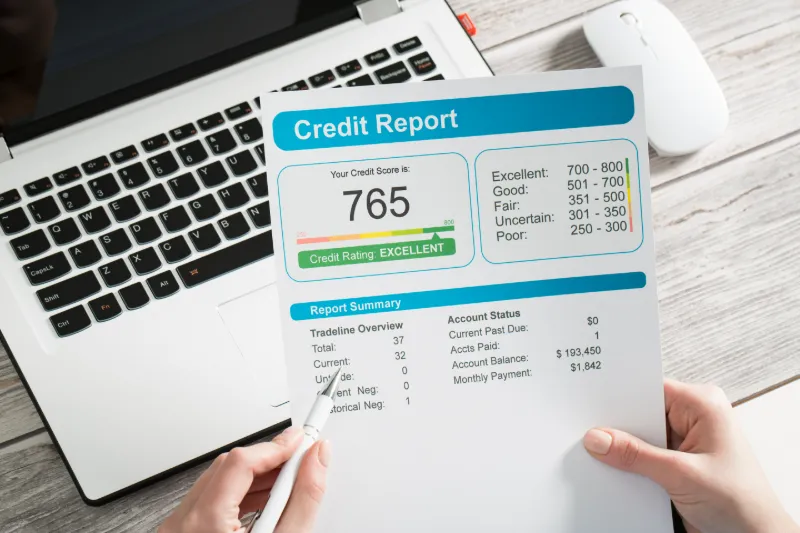Getting approved for a mortgage is an exciting step toward homeownership, but it requires careful…
Credit Impact On Conventional Loans in Charleston
When buying a home in Charleston, understanding the role of credit in securing a mortgage loan is crucial. Your credit report acts as a financial report card for mortgage lenders, providing insights into your payment history and creditworthiness. This blog explains the connection between credit and conventional loans in Charleston, equipping you with the knowledge to make informed financial decisions in the competitive housing market.
Understanding Conventional Loans
In the realm of mortgages, conventional loans stand apart as a popular choice among home buyers. These loans, as the name implies, are not backed by government agencies like the Federal Housing Administration (FHA). Instead, they are typically backed by private lenders or government-sponsored enterprises.
Conventional loans offer various advantages, including competitive interest rates and flexible terms. However, they also come with specific eligibility requirements, with credit history playing a significant role in the approval process. Your creditworthiness, reflected in your credit score, heavily influences whether you qualify for a conventional loan and the terms a lender might offer.
Conventional Loans Explained
Conventional loans are a type of mortgage not insured or guaranteed by the federal government, distinguishing them from government-backed options like FHA, VA, or USDA loans. They are offered by various mortgage lenders, including banks, credit unions, and online institutions. One of the defining characteristics of conventional loans is that they are generally offered by private lenders or government-sponsored enterprises such as Fannie Mae and Freddie Mac.
These loans adhere to guidelines set by Fannie Mae and Freddie Mac, ensuring uniformity and stability in the mortgage market. Furthermore, conventional loans provide borrowers flexibility in choosing between fixed-rate and adjustable-rate mortgages. Fixed-rate mortgages offer stability with unchanging interest rates throughout the loan term.
Adjustable-rate mortgages, however, come with an initial fixed-rate period, after which the rate fluctuates based on market conditions. This choice allows borrowers to select a loan structure best suited for their financial goals and risk tolerance.
The Role of Credit in Securing a Conventional Loan
Creditworthiness is incredibly important when it comes to securing a conventional loan. Mortgage lenders rely heavily on credit reports to assess the financial responsibility of potential borrowers. A credit report provides a comprehensive history of an individual’s credit accounts, including credit cards, loans, and payment history.
Lenders scrutinize payment patterns, outstanding balances, and any derogatory marks, such as late payments or collections. A strong credit history, characterized by on-time payments and responsible credit card use, signals to lenders a lower risk of default. Consequently, borrowers with good credit are more likely to be approved for conventional loans.
Conversely, a poor credit history can hinder loan approval or result in less favorable terms, such as higher interest rates. Understanding the factors that influence your credit score and actively working towards maintaining a good score is essential for navigating the conventional loan process effectively.
The Impact of Credit Scores on Conventional Loans in Charleston
In the vibrant Charleston housing market, where property values and demand remain relatively high, possessing a commendable credit score holds even greater weight. It not only improves your likelihood of securing a conventional loan but also significantly influences the interest rates you’ll be offered by lenders.
Given that Charleston boasts a competitive housing landscape, those with exceptional credit scores stand a much better chance of getting their offers accepted. Sellers and their agents often prioritize buyers perceived as lower risk, making a strong credit history an invaluable asset when vying for a property.
How High Credit Scores Benefit Borrowers
A high credit score is a golden ticket in the world of conventional loans. It unlocks a range of benefits, making the home buying journey smoother and, importantly, less expensive in the long run. Here’s how:
- Lower Mortgage Rate: The most enticing advantage is securing a lower mortgage rate. A lower rate translates to significant savings on interest payments over the life of the loan. Those with excellent credit are often presented with the most competitive rates.
- Negotiating Power: A high score gives you bargaining power. It enables you to negotiate better loan terms and potentially lower closing costs. Lenders are more inclined to offer favorable terms to those deemed less risky.
- Faster Approvals: Mortgage lenders view borrowers with high scores as less risky, streamlining the underwriting process for quicker loan approvals.
Challenges of Lower Credit Scores and Solutions
Having a lower credit score doesn’t necessarily mean you cannot secure a conventional loan in Charleston. However, it often translates to more challenging hurdles and less favorable terms:
- Higher Monthly Payments: A lower credit score often means qualifying for higher interest rates, leading to larger monthly mortgage payments.
- Limited Loan Options: Some lenders may hesitate to offer conventional loans to those with lower scores or be more restrictive in loan terms.
- Larger Down Payment Requirement: In some instances, a lower credit score might necessitate a larger down payment to offset perceived risk by the lender.
Even with a less-than-ideal credit score, avenues exist to make your homeownership dreams a reality:
- Explore FHA Loans: Consider government-backed FHA loans, known for their lower credit score requirements, as a viable alternative.
- Seek Payment Assistance Programs: Investigate down payment assistance programs available in Charleston to ease the financial burden.
- Improve Your Credit: Dedicate time and effort to improving your credit score before applying again.
Tips for Improving Your Credit Score Before Applying
If you’re planning to apply for a conventional loan, time is your friend. Taking proactive steps to improve your credit well before submitting your application can drastically increase your chances of approval and potentially lead to better loan terms:
- Review Your Credit Report: Begin by obtaining a copy of your credit report from the three major credit bureaus (Equifax, Experian, and TransUnion). Carefully examine each report for inaccuracies or errors and dispute any discrepancies you find.
- Pay Down Existing Debt: Reducing your existing debt, especially credit card balances, demonstrates responsible financial management. Aim to keep your credit utilization ratio (the amount of credit you’re using compared to your total available credit) below 30%.
- Make Timely Payments: Consistently making on-time payments for all your bills and financial obligations, including rent, utilities, and existing loans, plays a significant role in rebuilding credit. Set up reminders or automatic payments to ensure you never miss a due date.
Practical Steps to Elevate Your Credit
Building a healthy credit score is an ongoing process, but a few practical steps can help you move the needle:
- Obtain a Copy of Your Credit Report: Regularly review your credit report from each of the three major credit bureaus to identify and address any inaccuracies that could be negatively impacting your score.
- Limit New Credit Accounts: Refrain from opening multiple new credit accounts in a short period, especially before applying for a mortgage. Each application generates a hard inquiry on your credit report, potentially lowering your score.
- Manage Your Total Debt: Aim to keep your total debt-to-income ratio (DTI) – the percentage of your gross monthly income that goes toward debt payments – as low as possible. Lenders use this ratio to assess your ability to repay a mortgage. Generally, a lower DTI is more favorable.
Timing Your Loan Application for Optimal Credit Health
Timing plays a crucial role in maximizing your chances of getting approved for a conventional loan with the best possible terms. Understanding when to apply, based on your credit history, can significantly impact your loan success rate:
- Wait for a Minimum Credit Score: Before applying for a conventional loan, make sure your credit score meets or exceeds the minimum requirements set by most lenders. While a higher credit score typically corresponds to better terms, aiming for at least the minimum ensures you’re considered a viable candidate for a conventional mortgage.
- Capitalize on Favorable Mortgage Interest Rates: Keep a keen eye on mortgage interest rates, and aim to apply for your loan when rates are relatively low. This timing can save you substantial amounts on your monthly mortgage payments over the life of the loan.
- Present a Strong Financial History: Before applying, work towards demonstrating a consistent and strong financial history. Make timely payments on all your bills and ensure you aren’t carrying excessive debt. A solid financial track record portrays you as a responsible borrower to potential lenders.
Alternatives to Conventional Loans in Charleston
FHA, VA, and Jumbo Loans are alternative options to conventional loans, each tailored to specific borrower needs and situations. Federal Housing Administration (FHA) loans offer flexible credit requirements and lower down payments, making them accessible to a wide range of buyers. Veterans Affairs (VA) loans provide benefits to eligible veterans, including zero down payment and competitive interest rates. Jumbo loans, on the other hand, are ideal for high-cost properties that exceed conventional loan limits. Understanding the nuances of these specialized loan types can help borrowers make informed decisions based on their financial goals and circumstances.
Credit Requirements
To qualify for a conventional loan in Charleston, having a solid credit score is crucial. Most lenders typically prefer a credit score of at least 620 for conventional loans. However, to secure better interest rates and terms, a higher credit score, ideally above 740, is often recommended. Lenders also scrutinize your credit report for any late payments, bankruptcies, or high debt levels. Maintaining a clean credit history with no recent delinquencies is key. Mortgage companies assess your creditworthiness based on various factors, including your payment history, total debt, and the types of credit accounts you have. Understanding these credit requirements is essential for a successful conventional loan application.
Why Conventional Loans Stand Out in Charleston
Conventional loans stand out in Charleston due to their flexibility and appeal to a wider range of borrowers. Compared to other loan types, conventional loans offer competitive rates and terms, making them an attractive choice for those with good credit scores. Borrowers in Charleston benefit from the stability and predictability that conventional loans provide, along with the ability to finance various property types. Additionally, conventional loans do not have the strict eligibility criteria of other loan programs, giving borrowers more freedom in their financial decisions. This makes conventional loans a preferred option for many home buyers in Charleston looking for a reliable and customizable financing solution.
Frequently Asked Questions
What Minimum Credit Score Is Typically Required for a Conventional Loan in Charleston?
For a conventional loan in Charleston, a good starting credit score is typically around 620. Remember, individual lenders like Bank of America may have different requirements, so it’s best to contact them directly for specific information.
Can You Secure a Conventional Loan with an OK Credit Score?
Obtaining a conventional mortgage with a “fair” credit score (630-689) can be challenging. Lenders may impose stricter terms, like a larger down payment or higher interest rates. Consider exploring alternatives such as VA loans, USDA loans, home equity loans, or consulting a reputable mortgage broker.
How Does a Better Credit Score Affect My Loan Terms?
A higher credit score can improve your loan terms by securing lower interest rates from lenders. Responsible financial management leads to preferential treatment for lower risk borrowers, resulting in long-term savings through reduced monthly payments and total interest payments.
How Long Should I Wait After Improving My Credit Score to Apply?
After improving your credit score, wait a few months before applying for a mortgage. This allows time for your credit report to reflect the improvements from consistent payments and reduced debt levels. Consult a mortgage calculator or experts at the Financial Protection Bureau for personalized guidance on the best time to apply, ensuring a smoother process.
Conclusion
Understanding the impact of credit on conventional loans in Charleston is quite important. A high credit score can significantly benefit borrowers by offering better loan terms and lower interest rates. However, lower credit scores present challenges that can be overcome with proactive steps to improve credit health before applying for a loan. By timing your loan application strategically, you can optimize your credit score for the best possible loan terms. Taking practical measures to elevate your credit and secure a solid financial standing will enhance your eligibility for conventional loans in Charleston. Remember, a strong credit profile serves as a gateway to favorable borrowing opportunities.





